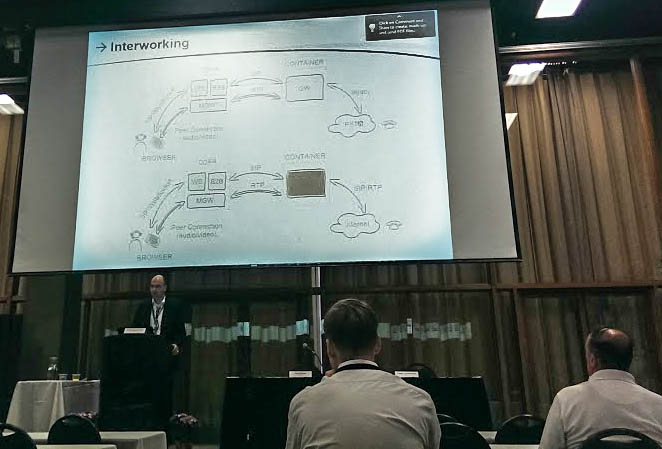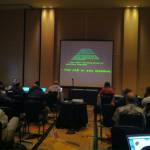Last week I attended the Illinois Institute of Technology Real-Time Communications (IIT-RTC) Conference in Chicago. This event has a history of attracting key players from around the RTC world. It features discussion that is distilled down to the key trends and technology challenges in the industry, with very little “fluff” on top. This year the IIT-RTC conference was co-located with IPTComm as well, adding to the quality of the content.
Topics at the conference touched on many segments of RTC, including IMS, RCS, E-911, OTT, and more. Our own Victor Pascual sits on the steering committee for the Web and Emerging Technologies track, where WebRTC was given particular focus. It began with a fantastic WebRTC tutorial from Alan Johnston (co-author of the SIP specification and a dozen other IETF RFCs) and Dan Burnett (co-editor of the W3C WebRTC specification). They are also both co-authors of “WebRTC: APIs and RTCWeb Protocols of the HTML5 Real-Time Web”, and provided a fantastic expert introduction to WebRTC APIs and methodologies. This set the tone for lots of excellent presentation, expert perspective, demonstrations, and discussion on WebRTC over the next few days. Here are some discussions I found particularly interesting:
WebRTC for Multi-National Disaster Response System
Wolfgang Kampichler from Frequentis AG described an interesting real-world use of WebRTC in assisting response to large scale multinational disaster scenarios. In a pilot deployment in Europe, Wolfgang and team had designed an ad-hoc wireless mesh network providing rapid deployment of an IP infrastructure. Once deployed, SIP infrastructure provided an RTC core and registrar within a mobile command center. The command center also served browser-based WebRTC clients to connected endpoints in the field. Additional components included SIP-over-WebSockets for endpoint signaling, media gateway for PSTN connectivity, and conferencing. In short, it was WebRTC connecting the “first-mile”, with sip in the back-end, and initial pilot tests of the system were very promising. It was interesting to see the Web chosen as an endpoint technology for something as critical as disaster response, perhaps a sign that WebRTC could be leveraged increasingly in emergency services. In this case, when rapid deployment, and high quality were key requirements, devices with browsers and WebRTC made endpoint management simple yet effective.
WebRTC and IMS
Anne Lee from Alcatel Lucent posed the question of whether or not a collection of silos using WebRTC will replace the PSTN/PLMN. She explicitly clarified that she was not asking if a collection of OTTs can provide service, as answer is obviously yes…but rather is a communication infrastructure with the universal reach of the PSTN/PLMN a thing of the past in an all-WebRTC world. An interesting look into the alternate futures of a world with and without such a network were laid out. Effectively it equated to two distinct models:
-
Island model: a caller goes to called party’s service provider to reach them
-
Interconnect model: caller’s SP is interconnected with the called’s
Clearly the interconnect model does require interoperability, while the island model does not. A number of requirements for these models were put forth, along with discussion on the usability of each. She proposed that while islands can, do, and will exist, IMS provides an interoperable framework that, with WebRTC, can satisfy demand for a next generation service providing universal reach. It was a very interesting presentation that highlighted the value that can be provided with a universal network of interconnected IMS accessed by WebRTC, while staying realistic about what place it might have in a future of island services.
WebRTC vs. VoIP
For my own part in the conference, I shared a presentation comparing the VoIP universe as it is deployed in most places today, with the rapidly expanding universe of WebRTC. Comparing and contrasting the two, I highlighted some trends, tools, and techniques that bridge the divide between these similar, but not quite interoperable worlds. The discussion skirted some of the “bell head” vs. “web head” flaming that the comparison can invoke, while providing good objective analysis of the collision of the two universes. My slides from the session can be found here.
ORCA in the Wild
Amid all the buzz about RTC on the web, one session featured a live demonstration of the Object-RTC (ORTC) API model for WebRTC. As previously discussed on a webrtcHacks guest post, this is the proposal from the W3C ORCA community group. The demonstration was a basic prototype running in Internet Explorer, delivered by Bernard Aboba, Principle Architect at Microsoft and Robin Raymond, Chief Architect at Hookflash. The demo hinted at the future promises from ORCA of a more object-oriented approach. Of particular interest was discussion about a possibility to take the ORTC engine server-side as a module in Node.js. This presents a very intriguing possibility for some scalable cloud based media processing applications that could interoperate with WebRTC.
High Signal-to-Noise
These were just a few of the interesting sessions that took place last week in Chicago, and there was much, much more. Between sessions, the hallways were filled with technical discussions, debate, perspective, and information sharing between many experts from all over the world of RTC. As I heard one attendee put it, the IIT-RTC Conference has a “high signal-to-noise ratio.” I couldn’t agree more.
Upcoming events
The webrtcHacks team is planning to speak at a number of upcoming events related to WebRTC during the last quarter of this year — we’ll publish conference reviews for some of those. So far we’ve the following in our list:
- Rich Communication 2013 (Berlin, 28-30 Oct 2013), where Victor Pascual will be speaking at the WebRTC workshop
- IETF 88 (Vancouver, 3-8 Nov 2013)
- Telecom APIs 2013 (London, 11-13 Nov 2013), where Victor Pascual will be speaking at the WebRTC track giving an update on WebRTC standardization
- WebRTC Conference and Expo (Santa Clara, 19-21 Nov 2013), where Victor Pascual will be moderating a couple of sessions at the Service Provider track and Chad Hart will be speaking on Collaboration and Conferencing Applications
- WebRTC Exhibition and Conference (Paris, 10-12 Dec 2013), where Victor Pascual wil be speaking about DataChannels
- WebRTC Israel Meetup (Tel Aviv, 16 Dec 2013), where Victor Pascual will be presenting remotely… hopefully via WebRTC
For some of the events above we can provide discount codes for our readers; just visit the event directory site. If you plan to attend any of those or happen to be in the city, please let us know and we’d be happy to meet up 😉
Have you already subscribed to our mailing-list, if not please click here as it just takes few seconds to join it.
{“author”, “reid“}








Leave a Reply